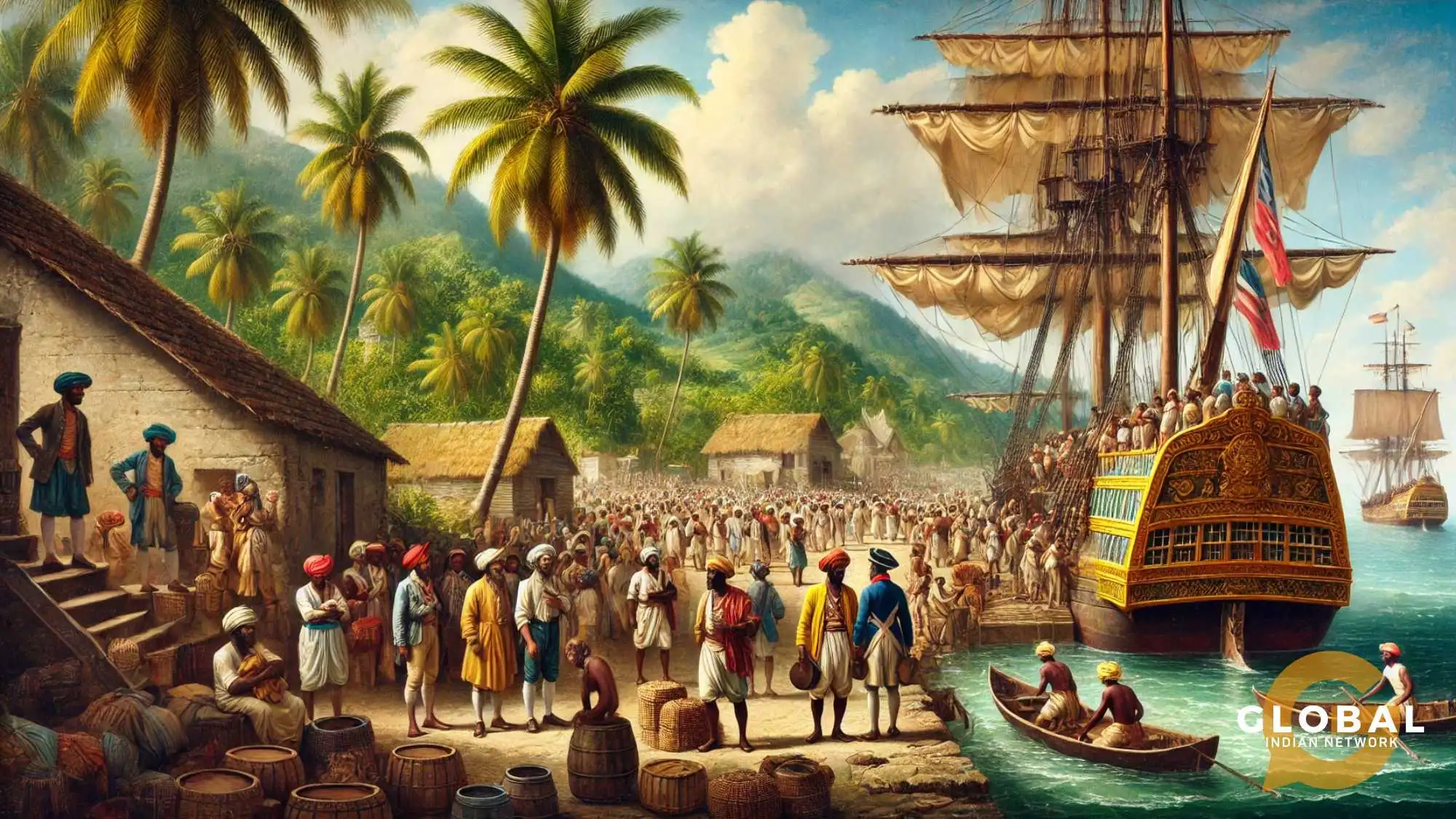Indi-Caribbean people form a large part of today’s Caribbean population. Tracing their routes back to Indian indentures from the central regions of India, the migration of Indians to the Caribbean brought unique traditions, beliefs, and practices that have since strengthened and grown more involved in the region’s culture. Today, the Indo-Caribbean diaspora strengthens the framework of identity in Caribbean societies and plays an important role in Caribbean nations.
Table of Contents
Historical Context: From Indian Indentures to Caribbean Communities
The Indo-Caribbean diaspora primarily began in the 19th century with the system of Indian indentures. Following the abolition of slavery, British, Dutch and French colonial plantations in regions like Trinidad & Tobago, Guyana, and Suriname turned to indentured Indian labourers to sustain their economies. To compensate for the lack of workers, the colonizers turned to false promises and exploited Indian labourers.
The British, Dutch and French lords shipped hundreds of thousands of workers by making them sign harsh contracts and promising healthy living conditions. Over half a million such workers were transported to the Caribbean nations to work under harsh conditions in sugar plantations. This migration marked the beginning of the Indian-Caribbean identity, and for decades, these workers continued to be mistreated. The workers were paid meagre salaries, were confined only to their estates, and often had their passports confiscated, which made returning impossible. In the social hierarchy, the early Indo-Caribbean diaspora was at the bottom.
The Indian indentures not only laid the foundation for a unique Indo-Caribbean identity but also contributed to the development of an identity that resonated with the experiences of other diasporas. These identities especially reflect the struggles and resilience of the ethnic minorities who were initially marginalized within the colonial hierarchy.

Indo-Caribbean Traditions in Modern Identity
While the initial people had a lot of hardship to endure, their struggle has left a lasting impact on Caribbean culture. The initial migration drive led to a large number of Indian descent people in the Caribbean islands. As the indentured period of the first-generation workers came to an end, many were given parcels of land and encouraged to settle rather than emigrate. This led to the intermingling of many cultures on the islands, creating a unique Indo-Carribean identity.
The Indo-Caribbean diaspora has enriched Caribbean culture through vibrant traditions, cuisine, music, and festivals. It has had an especially strong impact on the cuisine and music of the Caribbean. Additionally, the celebration of many festivals, such as Diwali and the fusion of Indian and Caribbean traditions, have become integral to the region’s cultural identity. This Indo-Caribbean identity is especially evident in practices such as extended family get-togethers, which serve as hubs of cultural exchange and preservation.
However, the evolution of Indo-Caribbean identity has not been without challenges. Racism against people of Indian origin and tensions with other ethnic groups have shaped the socio-political landscape of the region. Despite these challenges, Indo-Caribbean communities have maintained their unique cultural expressions while contributing significantly to the broader identity of the Caribbean.
Global Movements of Indo-Caribbean People
A global aspect of the second-generation Indo-Caribbean diaspora is its role in the formation of the “double diaspora.” This term refers to the migration of Indo-Caribbean individuals to countries such as the United States, Canada, and the United Kingdom, where they form distinct communities within the larger Asian diaspora races. These migrations emphasize the interconnectedness of global Indian diasporas. Double diaspora communities often navigate multiple layers and challenges of identity due to their ‘doubly removed’ natures. This is partly due to challenges in balancing their Caribbean heritage with their Indian roots, as well as incorporating the influences of their new homelands. This dynamic nature creates a multifaceted identity that challenges singular definitions of cultural belonging.

Economic Contributions and Social Impact
The Indo-Caribbean diaspora has also left a significant mark on the economic and social development of the Caribbean. From agriculture to business, members of this diaspora have been instrumental in shaping local economies. Generations of Indian immigrants are active in the fields of business and healthcare. Additionally, Indo-Caribbean experts in fields such as education, healthcare, and politics have played key roles in advancing the region. Institutions like the University of Trinidad serve as platforms for exploring Indian diaspora studies, contributing to a deeper understanding of Indo-Caribbean history and its relevance to modern identity.
The growing visibility of people of Indo-Caribbean descent in politics, arts, and academia is a promising sign that showcases the resilience of the community. Beginning as descendants of mistreated indentured labourers, the Indo-Caribbean diaspora has, through its rich history and vibrant culture, added to the region’s development while asserting its unique place within the global Asian diaspora.
Cultural Preservation
Efforts to preserve and celebrate Indo-Caribbean heritage have gained momentum in recent years. Many countries have begun to celebrate “Indian Arrival Day“, which is celebrated on May 30 in Trinidad and Tobago and on May 13 in Jamaica. Other countries like Martinique, Guadeloupe and St. Lucia have declared similar holidays, too, based on when the first Indian ships arrived. Furthermore, cricketing initiatives such as the ICC Indian Diaspora Country Tour and Indian Diaspora Country Tours have created opportunities for Indo-Caribbean people to reconnect with their Indian roots. These cultural exchanges help to document family histories and allow for a deeper appreciation of the legacies of first-generation indentures and their sacrifices.
The Indo-Caribbean diaspora continues to remain a cornerstone of Caribbean identity. The integration of Indo-Caribbean traditions with other cultural influences creates a dynamic and inclusive model of identity for the region. However, addressing challenges such as racism against people of Indian origin is critical to building a unified Caribbean identity.
ALSO READ: Indian Arrival Day: A Journey Through Time and Heritage
Conclusion
The Indo-Caribbean diaspora today is a showcase of resilience. From the struggles of indenture to the emergence of unique Indo-Carribean identities that enrich communities, the journey of Indo-Caribbean people highlights the importance of preserving cultural heritage while embracing new identities. Through the exploration of Indian diaspora studies and continued engagement in cultural initiatives, the Indo-Caribbean diaspora will continue to shape the Caribbean’s future while remaining a vital part of its past. This narrative not only strengthens the pronounced Indo-Caribbean identity but also serves as a testament to the enduring impact of ethnic minorities in shaping vibrant, multicultural societies.

FAQs
Why Did Indians Migrate to Trinidad?
Indians migrated to Trinidad primarily as indentured labourers between the 19th and 20th centuries. They were brought by the colonial rule to work on sugar plantations after the abolition of slavery created a labour shortage.
Which Caribbean Island has the Most Indians?
Guyana has the highest number of people of Indian descent in the Caribbean, followed by Trinidad and Tobago, where they also form a significant portion of the population.
Which part of India did indentured labourers come from in Trinidad?
Most indentured labourers to Trinidad came from Uttar Pradesh, Jharkhand, and Bihar, with smaller numbers coming from Tamil Nadu and other parts of India. They were predominantly recruited from rural areas.









